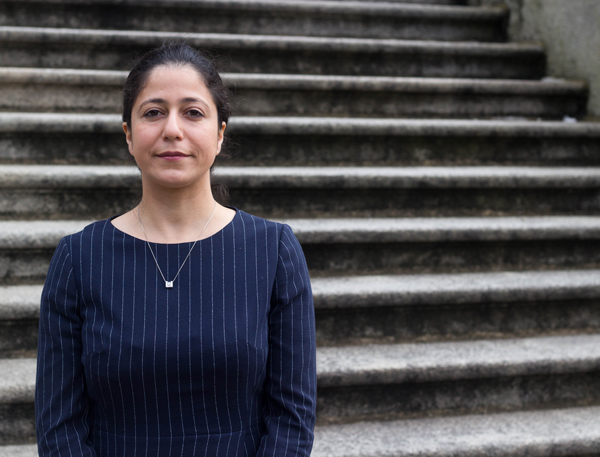
On Tuesday evening, the University Philosophical Society (the Phil) and the Trinity Global Development Society collaborated to host a talk on Islam and Feminism by Dr Roja Fazaeli. Fazaeli, as well as being a lecturer in Islamic Civilisations in the Department of Near and Middle-Eastern Studies in Trinity, is also the Chairperson of the Immigrant Council of Ireland and holds a position on the Editorial Board of the Journal of Religious and Human Rights. In the talk, she explored both her personal experiences in Iran and the wider issues of the relationship between Islam and the feminist movement.
Fazaeli began by recounting some of her own past. Having lost her father in the Iran-Iraq War of 1980 until 1988, she moved to Ireland in 1992. After visiting Iran in order to conduct some research for her master’s degree, she returned once again in 2004 in order to work for the NGO House of Culture and Sustainable Development.
It was during this placement that she was nominated to attend the Pan-Asian Youth Leadership Summit in Hiroshima on behalf of Iran. While in the airport, she and her companion were approached by officials who searched their bags and began to question her about her colleagues and friends. She recounted how this experience prompted significant anxiety as she did not understand why they were targeting her, or why they had such a wealth of personal information. “I didn’t consider myself a political activist”, she stated, “I was there just to gain experience and to do internships”, a fact that made these questions particularly alarming.
While she and her colleague were released without issue in the airport, this was not the end. Officials claiming to be from the Office of Immigration Affairs, but who were actually from the Interior Ministry, appeared at her house shortly after her return from the conference, where they searched her room and took her passports and her possessions away with them. She was promptly informed that they were in possession of her arrest warrant and she was to remain at her house.
Shortly after, she was called and instructed to report to morality police station. After following these instructions, she was subjected to a series of interrogations during which she was verbally abused. One particular interrogator berated her for being a feminist and campaigning for human rights, claiming that western perceptions of “human rights is against our religion”, before going on to insult the Iranian Nobel Peace Prize winner Shirin Ebadi, calling her “a sinner”.
Similarly, he claimed Fazaeli had ties to individuals she had never met, and he even tried to accuse her of Zina, or adultery, which was a very serious accusation that could lead to the death penalty. After several weeks, the mounting pressure being applied by her contacts in local human rights organisations and Amnesty international resulted in her eventual release.
Fazaeli claimed that her motivation for sharing the story was in order to shed light on “what many human rights activists regularly go through in Iran”. She also went on to share some of the arguments she made against her interrogators, during which she questioned whether their actions were a correct reflection of the teachings of Islam. She also maintained that her ordeal had no detrimental effects on her believes, instead claiming that “the state’s attempt to negate my feminism only confirmed it”.
Throughout the talk, Fazaeli took the opportunity to explore the relationship between feminism and Islam. She presented the audience with a commonly employed series of categories for Muslim feminists, before explaining the limitations of the system. Throughout the questioning, she also explored the relationships between Islam and feminism in other areas and was keen to stress that the perceptions she encountered in Iran were not reflective of other countries.
The talk provided an engaging and thought-provoking insight into Islamic feminism. Given the previous controversy caused by the Phil’s cancelled Middle Eastern Feminism debate earlier this year, it was particularly important that the topic was handled with care. This was certainly achieved and the amount of questions that followed Fazaeli’s talk is testament to this.






